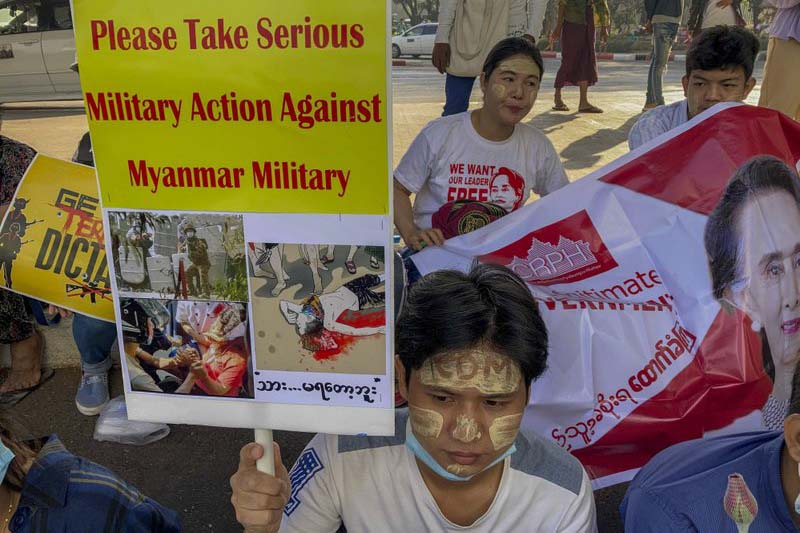

Social media giant Facebook announced Thursday it was banning all accounts linked to Myanmar’s military as well as ads from military-controlled companies in the wake of the army’s seizure of power on Feb. 1.
It said in a statement that it was treating the post-coup situation in Myanmar as an “emergency,” explaining that the ban was precipitated by events since the coup, including “deadly violence.”
Facebook’s action comes as diplomatic efforts to resolve Myanmar’s political crisis have intensified and protests continued in Yangon and other cities calling for the country’s coup makers to step down and return Aung San Suu Kyi’s elected government to power.
Facebook already has banned several military-linked accounts since the coup, including army-controlled Myawaddy TV and state television broadcaster MRTV.
The bans are also being applied on Instagram, which is owned by Facebook.
Facebook and other social media platforms came under enormous criticism in 2017 when right groups said they failed to act enough to stop hate speech against Myanmar’s Muslim Rohingya minority.
The army launched a brutal counterinsurgency operation that year that drove more than 700,000 Rohingya to to seek safety in neighboring Bangladesh, where they remain in refugee camps. Myanmar security forces burned down villages, killed civilians and engaged in mass rape in their campaign, which the World Court is investigating as a crime of genocide.
Facebook in 2018 banned the accounts of several top Myanmar military leaders, including Senior Gen. Min Aung Hlaing, who led this month’s coup that ousted the elected government of Aung San Suu Kyi and her National League for Democracy party. The general heads the junta that now acts as the government,
The junta has tried to block Facebook and other social media platforms, but its efforts have proven ineffective. For more than a week it has also turned off access to the internet nightly from 1 a.m.
Indonesian Foreign Minister Retno Marsudi on Wednesday visited the Thai capital, Bangkok, and held three-way talks with her Thai counterpart Don Pramudwinai and Myanmar’s new foreign minister, retired army colonel Wunna Maung Lwin, who also traveled to Thailand. The meeting was part of Marsudi’s efforts to coordinate a regional response to the crisis triggered by the military takeover in Myanmar.
Indonesia and fellow members of the Association of Southeast Asian Nations are seeking to promote some concessions by Myanmar’s military that could ease tensions to prevent more violence. The regional grouping, to which Thailand and Myanmar also belong, believes dialogue with the generals is a more effective method of achieving concessions than more confrontational methods, such as the sanctions often advocated by Western nations.
In a virtual news conference after her return to Indonesia, Marsudi said she expressed her country’s concern about the situation in Myanmar.
“We asked all parties to exercise restraint and not use violence . . . to avoid casualties and bloodshed,” she said, emphasizing the need for dialogue, reconciliation and trust-building.
Marsudi said she had conveyed the same message to a group of elected members of Myanmar’s Parliament who were barred by the military coup from taking their seats. The lawmakers are from Suu Kyi’s National League for Democracy party, which won a landslide victory in elections last November that would have given it a second five-year term in office.
After the coup, the group, called the Committee Representing Pyidaungsu Hluttaw, the name of the combined houses of Parliament, announced it was convening the body in an online session and appealed to the U.N. and foreign countries to treat it as Myanmar’s legitimate government.
It has received mounting support from Myanmar’s protest movement, but little if any foreign endorsements. Indonesia’s acknowledgement that the group has a role to play could open an avenue for negotiations between Myanmar’s ruling junta and its opponents.
Opposition to the coup continues inside Myanmar, with large demonstrations in many cities and towns.
There was a new look to anti-coup demonstrations Thursday, with protesters smearing a traditional yellow paste on their faces, as a proclamation of their national identity.
Outside the Hledan Centre in Yangon, where around 1,000 people gathered to keep up pressure on the new military regime, protestors wore the mixture, called thanaka, in broad swathes on their foreheads, cheeks and down their noses.
Some had slogans written into the designs.
Thanaka is made from pulverized tree bark. It is said to be good for the skin and to protect it from sunburn. It is ubiquitous in Myanmar and is as much a symbol of its culture as the sarong-like longyi skirt or the Shwedagon temple in Yangon.
There was a tense standoff on Wednesday in the country’s second-biggest city, Mandalay, where police holding riot shields and cradling rifles blocked the path of about 3,000 teachers and students.
After about two hours, during which demonstrators played protest songs and listened to speeches condemning the coup, the crowd moved away.
On Saturday, police and soldiers fatally shot two people in Mandalay while breaking up a strike by dock workers.
The military says it took power because last November’s election was marked by widespread voting irregularities, an assertion that was refuted by the state election commission, whose members have since been replaced by the ruling junta.
Despite the landslide victory by Suu Kyi’s party at the polls, the army blocked Parliament from convening and detained her and President Win Myint and other top members of her government.
The junta has said it will rule for a year under a state of emergency and then hold fresh elections.